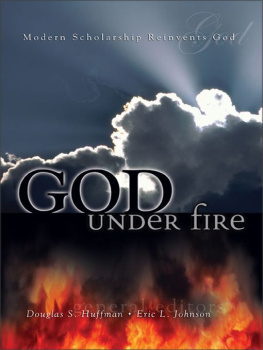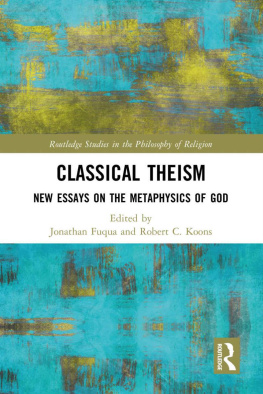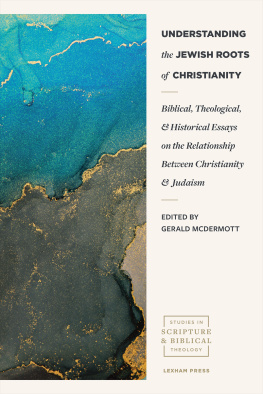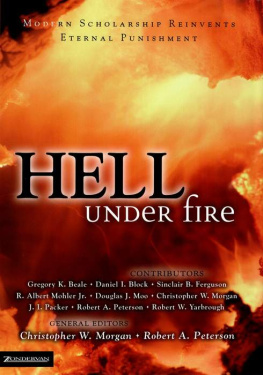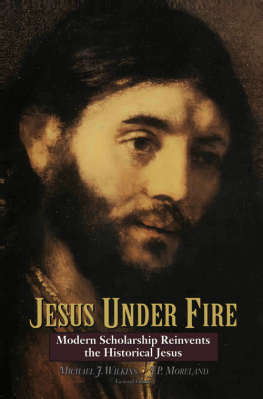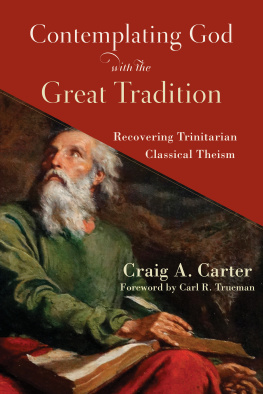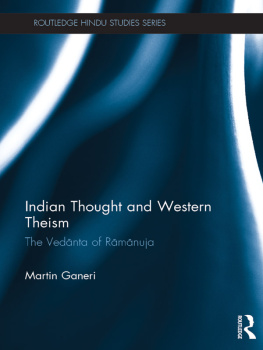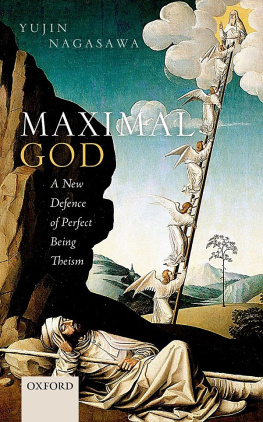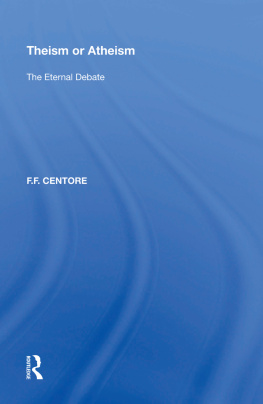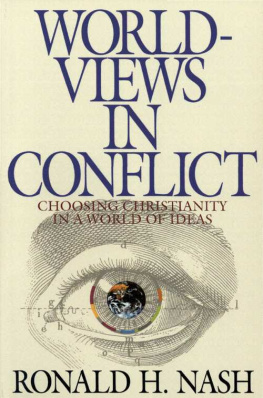
CONTRIBUTORS
Gerald L. Bray (Litt. D., University of Paris-Sorbonne), Anglican professor of divinity at Beeson Divinity School at Samford University in Birmingham, Alabama.
D. A. Carson (Ph.D., Cambridge University), research professor of New Testament at Trinity Evangelical Divinity School in Deerfield, Illinois.
William Lane Craig (Ph.D., University of Birmingham, England; D.Theol., Lugwig Maximilens UniversittMnchen, Germany), research professor of philosophy at Talbot department of philosophy, Biola University in La Mirada, California.
R. Douglas Geivett (Ph.D., University of Southern California), professor and department chair at Talbot Department of Philosophy, Biola University in La Mirada, California.
Charles E. Gutenson (Ph.D., Southern Methodist University), assistant professor of philosophical theology at Asbury Theological Seminary in Wilmore, Kentucky.
Paul Helm (M.A., University of Oxford), J. I. Packer chair of theology and philosophy at Regent College in Vancouver, British Columbia, Canada.
Douglas S. Huffman (Ph.D., Trinity Evangelical Divinity School), dean of admissions and records and associate professor of Bible at Northwestern College in St. Paul, Minnesota.
Eric L. Johnson (Ph.D., Michigan State University), associate professor of personality and pastoral theology at The Southern Baptist Theological Seminary in Louisville, Kentucky.
Patrick Lee (Ph.D., Marquette University), professor of philosophy at Franciscan University of Steubenville in Steubenville, Ohio.
James S. Spiegel (Ph.D., Michigan State University), associate professor of philosophy at Taylor University, Upland, Indiana.
Mark R. Talbot (Ph.D., University of Pennsylvania), associate professor of philosophy at Wheaton College in Wheaton, Illinois.
Bruce A. Ware (Ph.D., Fuller Theological Seminary), senior associate dean, school of theology and professor of Christian theology at The Southern Baptist Theological Seminary in Louisville, Kentucky.

ZONDERVAN
God Under Fire
Copyright 2002 by Douglas S. Huffman and Eric L. Johnson
All rights reserved under International and Pan-American Copyright Conventions. By payment of the required fees, you have been granted the non-exclusive, non-transferable right to access and read the text of this e-book on-screen. No part of this text may be reproduced, transmitted, downloaded, decompiled, reverse engineered, or stored in or introduced into any information storage and retrieval system, in any form or by any means, whether electronic or mechanical, now known or hereinafter invented, without the express written permission of Zondervan.
ePub Edition June 2009 ISBN: 978-0-310-83092-4
Requests for information should be addressed to:
Zondervan, Grand Rapids, Michigan 49530
Library of Congress Cataloging-in-Publication Data
God under fire : modern scholarship reinvents God / Douglas S. Huffman and Eric L. Johnson, general editors.
p. cm.
Includes bibliographical references.
ISBN 0-310-23269-4
1. God. 2. Apologetics. I. Johnson, Eric L., 1956. II. Huffman, Douglas S., 1961.
BT103.G63 2002
231dc21 2002009297
All Scripture quotations, unless otherwise indicated, are taken from the Holy Bible: New International Version . NIV. Copyright 1973, 1978, 1984 by International Bible Society. Used by permission of Zondervan. All rights reserved.
All rights reserved. No part of this publication may be reproduced, stored in a retrieval system, or transmitted in any form or by any meanselectronic, mechanical, photocopy, recording, or any otherexcept for brief quotations in printed reviews, without the prior permission of the publisher.
Interior production by Beth Shagene
To those many individuals
those currently living as well as those
who have lived in previous centuries
who love God ,
who want to know Him better ,
and who, caring more for the Truth than for personal comfort ,
have chosen to live their livesand even give their livesfor His glory.
DOUG

To Laura and Iain ,
Channels to me of Gods love and delight ,
May the living God of historic Christianity ever be your supreme joy.
ERIC
TABLEOF CONTENTS
We are grateful to the many people who have made this volume possible. First, we thank the people of Zondervan, specifically Stan Gundry for seeing merit to this project, and Jack Kuhatschek and Verlyn Verbrugge for seeing it to its realization.
Second, we are indebted to this volumes contributors. The modern professional disciplines of theology, biblical studies, and philosophy require not only skills in research and writing, but skills in a kind of juggling as wellthe juggling of writing, speaking, and teaching commitments. Our contributors have made time for this project and have tolerated our suggestions and adjusted expectations. For their hard work, we are grateful.
Third, we thank the many who have lent a hand to us along the way. This includes our institutionsNorthwestern College in St. Paul, Minnesota, and The Southern Baptist Theological Seminary in Louisville, Kentuckyand our colleagues and administrators there. We appreciate their encouragement and the leadership at these institutions. Several students helped with various research tasks, including Justine (Lund) Carlson, Ben Reese, and Carsten Christensen. We especially thank Keith Whitfield and Jonathan Leeman for compiling the indexes.
Finally, we thank our wives and children for their vicarious commitment to this project by their support of us in it.
| CSPR | Cornell Studies in the Philosophy of Religion |
| CWS | Classics of Western Spirituality |
| JETS | Journal of the Evangelical Theological Society |
| KJV | King James Version |
| LCC | Library of Christian Classics |
| NASB | New American Standard Bible |
| NIV | New International Version |
| NPNF | Nicene and Post-Nicene Fathers |
| NRSV | New Revised Standard Version |
| RSV | Revised Standard Version |
| SJT | Scottish Journal of Theology |
| TrinJ | Trinity Journal |
| TynBul | Tyndale Bulletin |
| WBC | Word Biblical Commentary |
| WTJ | Westminster Theological Journal |
1. Introduction
For much of the twentieth century, the very notion of God was under fire. Belief in God was regarded by most Western intellectuals as a vestige of our premodern heritage, to be shed with all other superstition. The God of the Bible (and of the premodern era) was considered too powerful, too primitive, and too irritable for modern tastes and was let go.
But times have changed. Surveying developments of the past decade, one might think we are in the midst of a postmodern revival. Time and Newsweek are regularly carrying religious cover stories. For years Touched by an Angel has been touching millions in prime time, while by day Oprah was promoting a similar kind of warm and fuzzy spirituality. For more intellectual viewers, public televisionlong home to series like Carl Sagans Cosmos (a universe devoid of God but populated with aliens) or Leo Buscaglias gospel of self-lovehas been airing Bible studies on the book of Genesis. In the 1990s, best-selling books included Conversations with God, God: A Biography , and The History of God , and a singer famously asked, What if God was one of us? A number of movies of loving angels and a heaven for all good people currently compete in the video stores with less spiritual fare. We might not be as surprised that politicians, regardless of political persuasion or personal morality, make repeated reference to God. But when cultural leaders and pop icons throughout America call us to God after a national tragedy like 9/11, it is clear that God has been raised from the dead to which he was consigned in the 1960s. God is back and is being welcomed with open arms.

